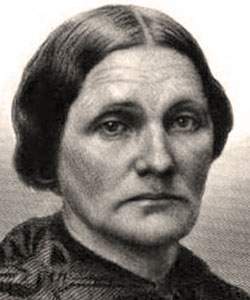Mary Ann Ball Bickerdyke (American National Biography)
Scholarship
As a Congregationalist in Galesburg, Bickerdyke attended the church of Edward Beecher, brother ofCatharine Beecher and Harriet Beecher Stowe. Shortly after the outbreak of the Civil War in 1861, the minister received a letter from Dr. Benjamin Woodward regarding the degraded state of soldiers' accommodations in Cairo, Illinois. The plea for medical help prompted Bickerdyke to leave her sons in the care of another family and travel to Cairo, bringing with her $100 worth of donated medical supplies and food. There she found soldiers ill from squalid living conditions, bereft of sanitation or a balanced diet. She proceeded to have them stripped and bathed, saw to the washing of clothes and bedding, and cooked meals, all in defiance of army regulations excluding women from its encampments without permission.
While army officials battled her presence with rules and regulations, Bickerdyke began a quiet medical revolution. The army medical department, preoccupied with pain control and amputations to forestall infection, did not consider cleanliness, fresh air, and diet as significant factors in the treatment of illness. Bickerdyke, though, persevered by sheer energy and force of character to treat the soldiers, and she was soon assisted by Cairo resident Mary Safford. Their success was such that when an army hospital building was finally designated in Cairo, Bickerdyke became its matron. There she dealt with the realities of an army staff that stole food and clothes and men who drank on the job.
While army officials battled her presence with rules and regulations, Bickerdyke began a quiet medical revolution. The army medical department, preoccupied with pain control and amputations to forestall infection, did not consider cleanliness, fresh air, and diet as significant factors in the treatment of illness. Bickerdyke, though, persevered by sheer energy and force of character to treat the soldiers, and she was soon assisted by Cairo resident Mary Safford. Their success was such that when an army hospital building was finally designated in Cairo, Bickerdyke became its matron. There she dealt with the realities of an army staff that stole food and clothes and men who drank on the job.
Sarah H. Gordon, "Bickerdyke, Mary Ann Ball," American National Biography Online, February 2000, http://www.anb.org/articles/12/12-00074.html.





